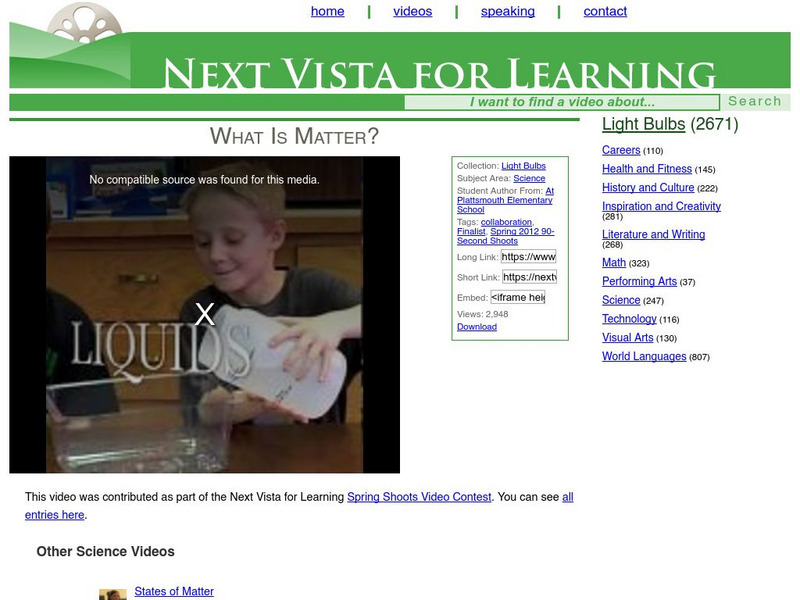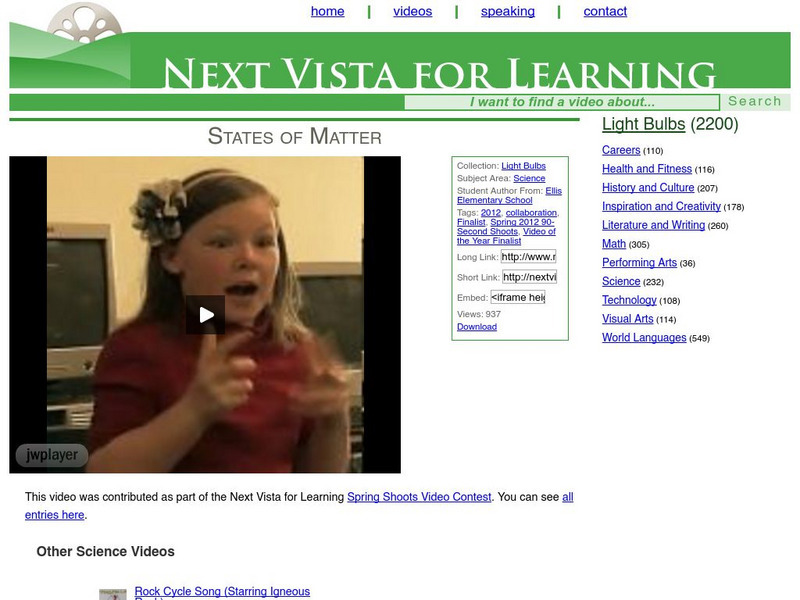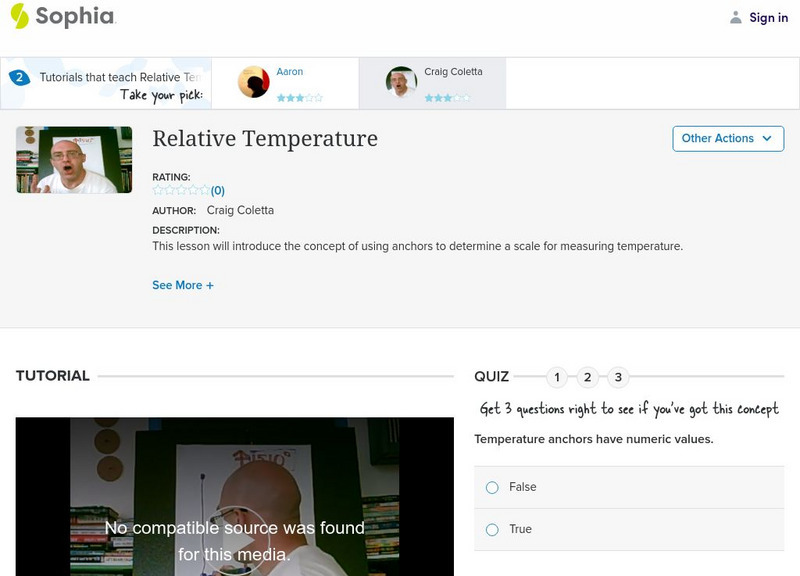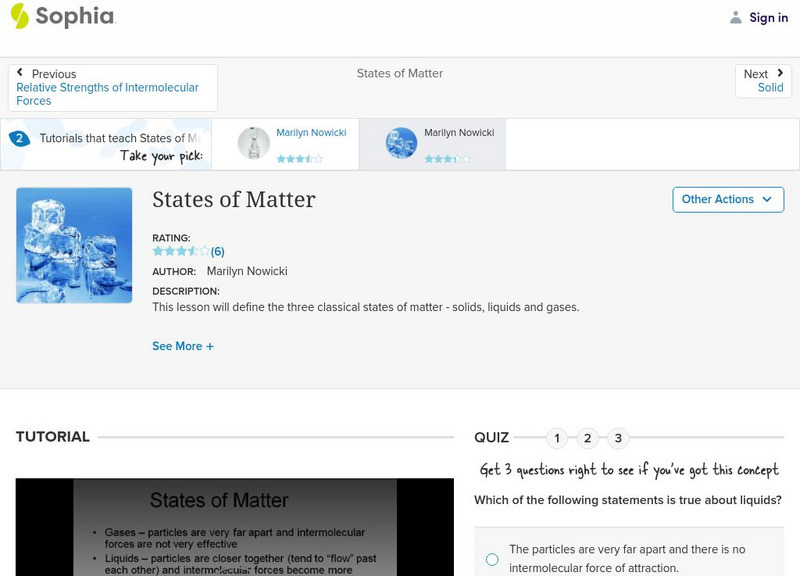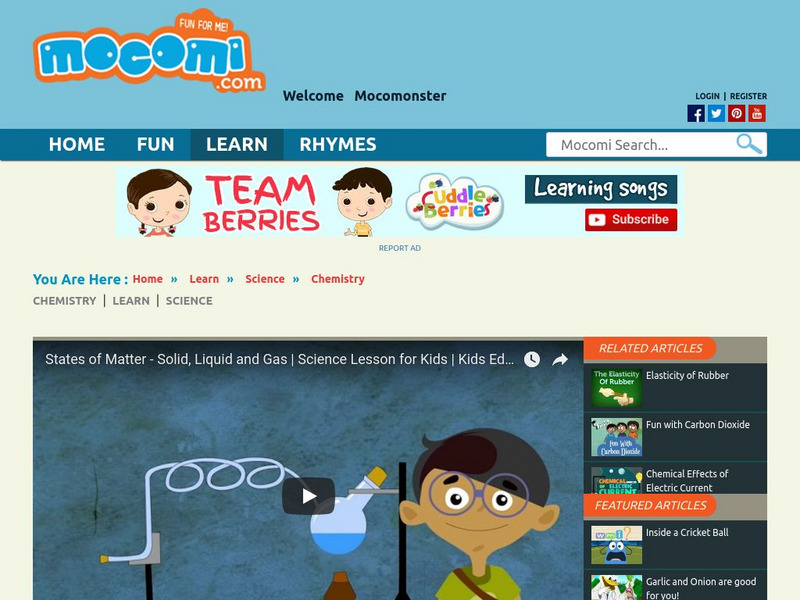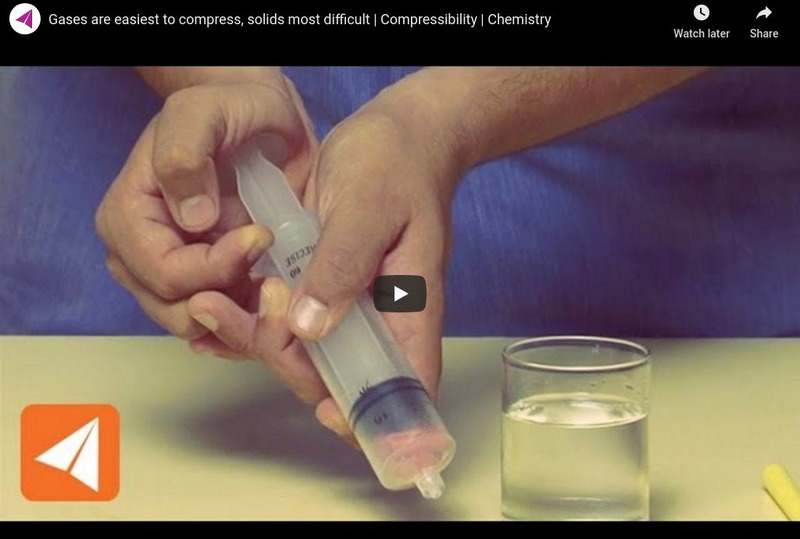Hi, what do you want to do?
PBS
Pbs Learning Media: Crash Course Chemistry: Stoichiometry: Chemistry for Massive Creatures
Chemists need stoichiometry to make the scale of chemistry more understandable - Hank is here to explain why, and to teach us how to use it. [12:46]
Next Vista for Learning
Next Vista for Learning: What Is Matter?
A video exploring how matter is defined as anything that takes up space and has mass. Learn that matter is made up of tiny particles. Video also investigates the different states of matter. [1:45]
Next Vista for Learning
Next Vista for Learning: States of Matter
Video shows a dating show game where the bachelor learns more about the properties of the contestants, solid, liquid, and gas. [1:48]
Next Vista for Learning
Next Vista for Learning: The Three States of Matter
A video showing images and examples of the three states of matter. [1:38]
Science Friday Initiative
Science Friday: Cracking the Cool Science of Ice
Sure, it's just frozen water, but what IS ice really?
Sophia Learning
Sophia: Gas: Lesson 2
This lesson will explore a gas from a molecular viewpoint and describe its general properties. It is 2 of 2 in the series titled "Gas."
Sophia Learning
Sophia: Relative Temperature: Lesson 2
This lesson will introduce the concept of using anchors to determine a scale for measuring temperature. It is 2 of 5 in the series titled "Relative Temperature."
Sophia Learning
Sophia: Relative Temperature: Lesson 1
This lesson will introduce the concept of using anchors to determine a scale for measuring temperature. It is 1 of 5 in the series titled "Relative Temperature."
Sophia Learning
Sophia: States of Matter: Lesson 1
This lesson will define the three classical states of matter - solids, liquids and gases. It is 1 of 2 in the series titled "States of Matter."
Sophia Learning
Sophia: Chemical Equation: Vocabulary: Lesson 2
This lesson will explain the general format of a chemical equation including products, reactants, arrow notation, and states of matter. It is 2 of 2 in the series titled "Chemical Equation: Vocabulary."
Mocomi & Anibrain Digital Technologies
Mocomi: States of Matter: Solid, Liquid, Gas
Matter presents itself with different characteristics. This video clip will help students recognize the three states. [2:29]
Bozeman Science
Bozeman Science: Ap Chemistry: Solids and Liquids
Paul Andersen compares and contrasts the properties of solids and liquids. Solids have a more organized structure which can either be amorphous or crystalline. In liquids the intermolecular forces are lower and so the molecules can show...
Other
K Class Science: Gases Easiest to Compress, Solids Most Difficult Compressibility
This demonstration uses some common objects to illustrate the compressibility of the states of matter.
PBS
Pbs Learning Media: Crash Course Chemistry: Network Solids and Carbon
In this episode, Hank talks about Network solids and Carbon and how you can actually create a Diamond from plain old Carbon... well, YOU probably can't unless you own a bunch of elephants. It's a long story. BUT, within you will learn...
PBS
Pbs Learning Media: Crash Course Chemistry: Entropy: Embrace the Chaos!
Life is chaos and the universe tends toward disorder. But why? If you think about it, there are only a few ways for things to be arranged in an organized manner, but there are nearly infinite other ways for those same things to be...
PBS
Pbs Learning Media: Crash Course Chemistry: Partial Pressures & Vapor Pressure
We continue to spend quality time with gases, more deeply investigating some principles regarding pressure - including John Dalton's Law of Partial Pressures, vapor pressure - and demonstrating the method for collecting gas over water....
PBS
Pbs Learning Media: Crash Course Computer Science: Integrated Circuits & Moore's Law
So you may have heard of Moore's Law and while it isn't truly a law it has pretty closely estimated a trend we've seen in the advancement of computing technologies. Moore's Law states that we'll see approximately a 2x increase in...
PBS
Pbs Learning Media: Crash Course Physics: Simple Harmonic Motion
Bridges...bridges, bridges, bridges. We talk a lot about bridges in Physics. Why? Because there is A LOT of practical physics that can be learned from the planning and construction of them. [9:10]
PBS
Pbs Learning Media: Crash Course Chemistry: Ideal Gas Problems
We don't live in a perfect world, and neither do gases - it would be great if their particles always fulfilled the assumptions of the ideal gas law, and we could use PV=nRT to get the right answer every time. Unfortunately, the ideal gas...
PBS
Pbs Learning Media: Crash Course Physics: The Physics of Music
Music plays a big part in many of our lives. Whether you just like to listen or you enjoy playing an instrument, music is powerful. So what is music? How does it work? [10:34]
PBS
Pbs Learning Media: Crash Course Physics: Voltage & Capacitors
So, how do those defibrillators you see on TV actually work? Surprise! Physics can explain! Okay buckle up, everyone! Today, Shini has the task of breaking down Electrical Potential Energy, Electric Potential, Voltage, Capacitors, Energy...
PBS
Pbs Learning Media: Crash Course Chemistry: Nuclear Chemistry
In this episode, Hank talks about transmutation among elements, isotopes, calculating half-life, radioactive decay, and spontaneous fission. [9:56]
PBS
Pbs Learning Media: Crash Course Physics: The Physics of Heat
Have you ever wondered why we wear clothes? I mean, beyond the obvious. Why does wearing a jacket in the cold keep your warmer? What is happening to all the heat inside your body? In this episode of Crash Course Physics, Shini talks...
PBS
Pbs Learning Media: Crash Course Chemistry: Electrochemistry
Contained within, Hank discusses electrochemical reactions. The episode looks at half reactions, how batteries work, galvanic cells, voltage, standard reduction potential, cell potential, electrolysis, and electro plating and the things...






